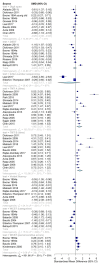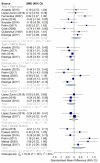Exploring Language Learning as a Potential Tool against Cognitive Impairment in Late-Life Depression: Two Meta-Analyses and Suggestions for Future Research
- PMID: 32878051
- PMCID: PMC7551097
- DOI: 10.3390/bs10090132
Exploring Language Learning as a Potential Tool against Cognitive Impairment in Late-Life Depression: Two Meta-Analyses and Suggestions for Future Research
Abstract
Late-life depression (LLD) affects about an eighth of community-dwelling seniors. LLD impacts well-being, with loneliness and small social networks being typical. It has also been linked to cognitive dysfunction and an increased risk of developing dementia. Safety and efficacy of pharmacological treatments for LLD have been debated, and cognitive dysfunction often persists even after remission. Various cognitive interventions have been proposed for LLD. Among these, one has received special attention: foreign language learning could serve as a social intervention that simultaneously targets brain structures affected in LLD. Lifelong bilingualism may significantly delay the onset of cognitive impairment symptoms by boosting cognitive reserve. Even late-life foreign language learning without lifelong bilingualism can train cognitive flexibility. It is then counterintuitive that the effects of language learning on LLD have never been examined. In order to create a theoretical basis for further interdisciplinary research, this paper presents a status quo of current work through two meta-analyses investigating cognitive functioning in LLD on the one hand and in senior bilinguals or seniors following a language course on the other hand. While LLD was consistently associated with cognitive dysfunction, inconsistent results were found for bilingualism and language learners. Possible reasons for this and suggestions for future research are subsequently discussed.
Keywords: bilingualism; cognitive function; language learning; late-life depression; meta-analysis; seniors; systematic review.
Conflict of interest statement
The authors declare no conflict of interest.
Figures




References
-
- Kangas O. One hundred years of money, welfare and death: Mortality, economic growth and the development of the welfare state in 17 OECD countries 1900–2000. Int. J. Soc. Welf. 2010;19:S42–S59. doi: 10.1111/j.1468-2397.2010.00735.x. - DOI
-
- American Psychiatric Association . Diagnostic and Statistical Manual of Mental Disorders 1. American Psychiatric Association; Arlington, VA, USA: 2013. - DOI
Publication types
Grants and funding
LinkOut - more resources
Full Text Sources

